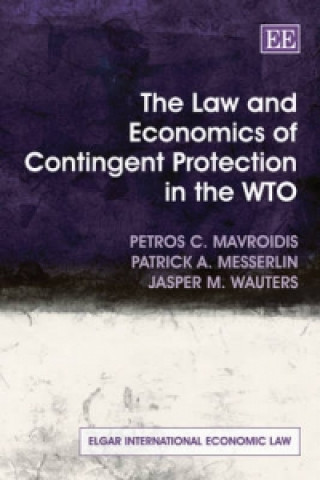
Доставка
Наръчник за пазаруване





Не ви допада? Няма проблеми! При нас имате възможност за връщане в рамките на 30 дни
 Подаръчен ваучер
на всякаква стойност
Подаръчен ваучер
на всякаква стойност
Няма да сбъркате с подаръчен ваучер. Получателят може да избере нещо от нашия асортимент с подаръчен ваучер.
Law and Economics of Contingent Protection in the WTO
 Английски език
Английски език
 606 b
606 b
30 дни за връщане на стоката
Може би ще Ви заинтересува


In this important book, three of the leading authors in the field of international economic law discuss the law and economics of the three most frequently used contingent protection instruments: antidumping, countervailing measures, and safeguards. When discussing countervailing measures, the authors also discuss legal challenges against prohibited and/or actionable subsidies. The authors' choice is mandated by the fact that the effects of a subsidy cannot always be confined to the market of the WTO Member wishing to react against it.Assuming there are effects outside its market, an injured WTO Member can challenge the scheme as such before a WTO panel. Taking the three agreements for granted as a starting point, the book provides comprehensive discussion of both the original contracts, and the case law that has substantially contributed to the understanding of these agreements. The agreements discussed by the authors provide generally worded disciplines on Members and leave a lot of discretion to the investigating authorities of such Members. A great number of the many questions that arise in the course of a domestic trade remedies investigations are not explicitly addressed in these agreements. In such a situation, the authors highlight the important role that the judge has to play.Much like domestic investigating authorities adopt a line which is either more liberal or more protectionist in the application of trade remedies, the WTO adjudicator on numerous occasions was faced with similar policy problems in applying the general rules to the facts of the case before them. The authors point out that the adjudicating bodies have insisted on the unfair character of dumping in order to substantiate their relatively deferential standard of review. In the anti-dumping/countervailing duties context, case law has generally emphasized the limited character of the obligations on investigating authorities. This implies that domestic investigating authorities, following the evolution of case-law, are now facing a deferential standard of review when imposing antidumping and countervailing duties.The book offers a contrasting view of the Agreement on Safeguards, an instrument the use of which, according to the authors, could, in principle, be defensible: WTO members will have extra incentives to make commitments within a flexible contract. Moreover, safeguards can, in their view, help ease the pressures from domestic lobbies by facilitating (sometimes necessary) adjustment costs. However, the case law is described by the authors as having adopted a rather inflexible stance, the end result of which is that no imposition of safeguards has survived the test of consistency with WTO law. They identify the apparent rationale for the case law as an over-insistence on what they label the highly uninformative fair/unfair trade distinction.The economic analysis employed by the authors would suggest that - in the light of the unsatisfactory nature of antidumping measures, contrasted with the positive incentives inherent in safeguards - ultimately one could envisage merging the three instruments of contingent protection into one new safeguards instrument. Equally, they argue, this economic approach, combined with legal doctrine, offers great insight into the current provisions, allowing them to be interpreted in a more coherent and meaningful manner.
Информация за книгата
 Английски език
Английски език
Категории


 Контакт
Контакт Как се пазарува?
Как се пазарува?
























